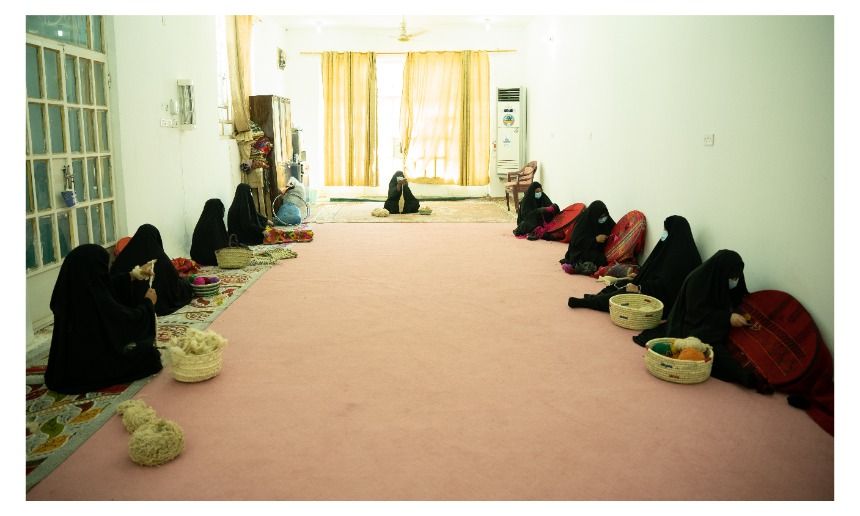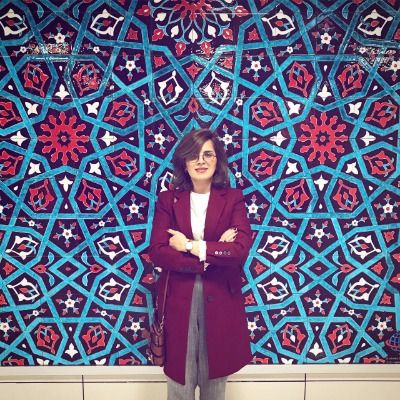Simawa Rugs, A Biomimicry Social Textile Project
Creating colorful and handmade rugs in the heart of the desert and from natural sheep wool. A solution to the poverty in rural areas and to the sheep shear waste.

The local solution “Simawa Rugs, A Biomimicry Social Textile Project” belongs to Bait Alhiraf, the first registered trademark for Iraqi handicrafts and souvenirs. Bait Alhiraf was established by an Iraqi woman to promote Iraqis' heritage and sustainability for Iraqi artisans.
In Simawa Governorate, 55% of its residents experience poverty, and as such these vulnerable groups require opportunities to increase their income to sustain life’s basic needs. On the other hand, and especially in the Arab region, there are a lot of untapped resources that are considered small fortunes for the residents. In Simawa, that’s sheep wool that was shorn, which is usually disposed in landfill and is harmful to the environment.
This ‘local solution’ responds to two pressing challenges: employment and climate change. By using the animal’s shear waste to create local products by Iraqi hands, this solution reopens the market for forgotten items from the Iraqi civilization, providing opportunities for vulnerable groups in rural areas who are talented and motivated to use the available local resources in their region.
In Iraq, we used to have textile factories with quality products, and a lot of people gained their skills through working in such factories. However, the situation today is different. Most textile factories closed down due to a greater dependency on imported goods. Bait Alhiraf is targeting local artisans to revive their artistic goods and establish a new generation of talented people. Bait Alhiraf’s workers search for the materials (sheep’s wool) and provide the labor force, including much-needed employment opportunities. As a result, they create eco-friendly local products that are in demand without importing anything from abroad. This final product contains messages from the Iraqi heritage that we cannot see through the imported products. The equipment used in the production process is 100% made in Iraq.
Why is it called a Biomimicry Social Textile Project? Because Biomimicry is the science of applying designs inspired by nature, into human engineering and invention, to solve human problems. The process of producing the rugs from sheep’ wool is inspired from nature. During the warmer months, it is common for sheep’s wool to be shorn, and this inspired Bait Alhiraf to do something with the waste, promoting a cleaner and healthier environment. These rugs are handcrafted in an innate way that simulates the difficult environment in which the artisans live, on the land borders between Saudi Arabia and Iraq where there are no colors and only arid desert and people who are disconnecting from the outside world. These local artists were inspired by the nature around them because this is what they know since ever.
The Rug making is an endangered craft and this profession has been overshadowed by cheaper, important goods, making it difficult for artisans to earn a reliable income. Also, products are not properly marketed in cities. As it is an important tribal product for the country and it is the task of the state and society to preserve it. In addition, this business is focusing on empowering women through enhancing their skills.
In rural areas in Iraq, this craft is led by women. The project is unique as it provides work opportunities for vulnerable people and at the same time, promotes waste management for a healthier environment. Also, this business highlights Iraq’s forgotten crafts and in alignments with government initiatives that are called “made in Iraq”. This initiative is a huge campaign from different stakeholders in Iraq to promote the concept of utilizing the natural resources to produce local products.
The main challenge is the logistics, due to the project being in a remote and rural area. In order to overcome this challenge, Bait Alhiraf worked on hiring coordinators who are also residents in Al Simawa. Another considerable challenge is, that the raw material is thrown in landfills, and no artisan could go there. Bait Alhiraf discovered the place where this waste was sold and managed to obtain the raw material.
The idea of this project came to Ms. Noor Hashim (owner and CEO of Bait Alhiraf) during one of her business trips, when she found that the raw materials were being thrown, and discovered that this material could be used to produce an item that is 100% local. Ms. Noor Hashim already has a project that encourages the handicrafts, and promotes for woven items as well as rugs.
In Iraq, almost everything is imported, and that goes for the handicrafts as well. When Bait Alhiraf focused on local items and raw materials, COVID-19 happened, the borders where closed, and the project flourished, as the woolen strings were sold to other merchants. These strings are not only used in rug making, artisans could stitch or knit using them, or they could be exported to other countries. This solution is mapped by the UNDP Accelerator Lab Iraq to be in the Lab’s portfolio of solutions to tackle the climate change challenges in Iraq.
Meet the solution owner
